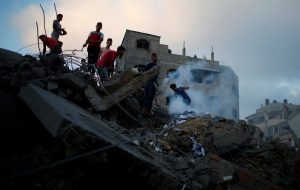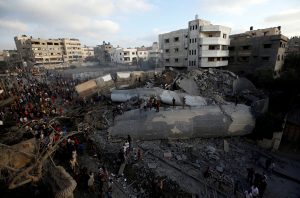
GAZA (Reuters) – An Egyptian-brokered truce ended a two-day wave of rocket barrages and air strikes between Israel and Gaza, but the border remained tense as thousands of Gazans gathered for protests in which two Palestinians were killed and scores wounded.
After a quiet night with no rockets falling in Israel or air strikes in Gaza, residents in southern Israel, who had spent much of the past two days in rocket shelters, were told by the military they could return to their daily routines.
In Gaza, crowds of Palestinians resumed protests against Israel. Reuters TV footage showed plumes of smoke blackening the sky at one area of the border after Palestinians set tires ablaze, and tear gas canisters fired by Israeli soldiers.

Palestinians gather on the remains of a building after it was bombed by an Israeli aircraft, in Gaza City August 9, 2018. REUTERS/Mohammed Salem
Israeli troops killed two Palestinians and wounded about 240 others, Palestinian health officials said.
The Israeli military said rioters hurled stones, explosives, and firebombs at troops and the border fence. The soldiers “responded with riot dispersal means and live fire, in accordance with the standard operating procedures”, a spokeswoman said.
A tank also fired at a Hamas outpost, the military said.
Since the weekly protests began on March 30, the Israeli army has killed 159 Palestinians and a Gaza sniper has killed an Israeli soldier.
Still, the broader truce held on Friday after a two-day escalation during which the Hamas militant group fired scores of rockets, including a long-range missile deep into Israel, and Israeli aircraft struck more than 150 targets in Gaza.

Palestinians gather around a building after it was bombed by an Israeli aircraft, in Gaza City August 9, 2018. REUTERS/Mohammed Salem
A pregnant Palestinian woman and her 18-month-old child were killed in the Israeli attacks, as was a Hamas militant. Seven people were wounded by Palestinian rockets and mortars that struck Israel.
Israel and Egypt, citing security concerns, maintain a blockade on Gaza, a narrow strip of land that is home to two million Palestinians, which has reduced its economy to a state of collapse.
A senior Egyptian official said Cairo was working to secure a comprehensive agreement between Israel and Hamas, beginning with a ceasefire and later including economic improvements.
(Reporting by Nidal al-Mughrabi, Ari Rabinovitch and Cairo newsroom; editing by Andrew Roche)


